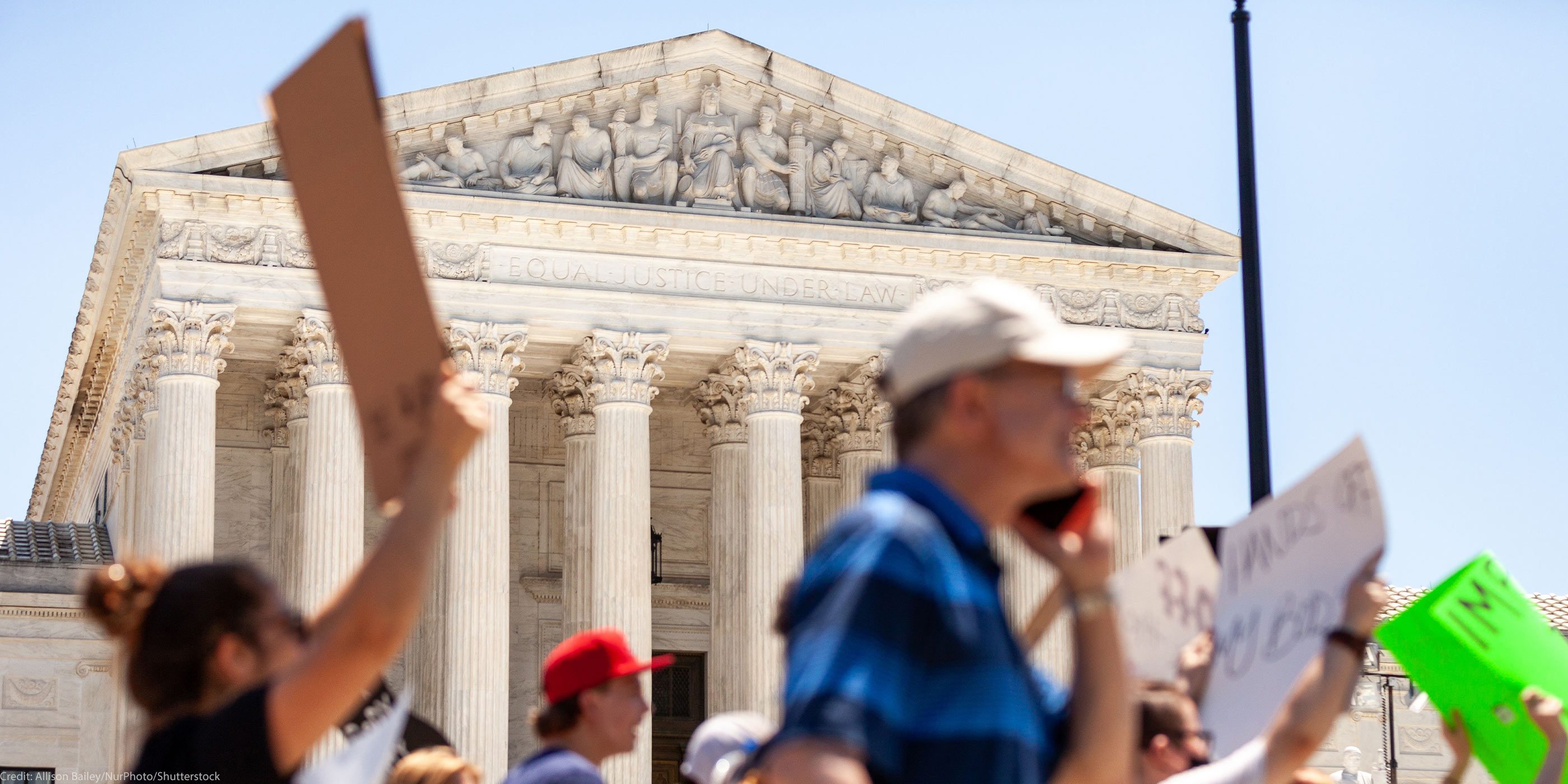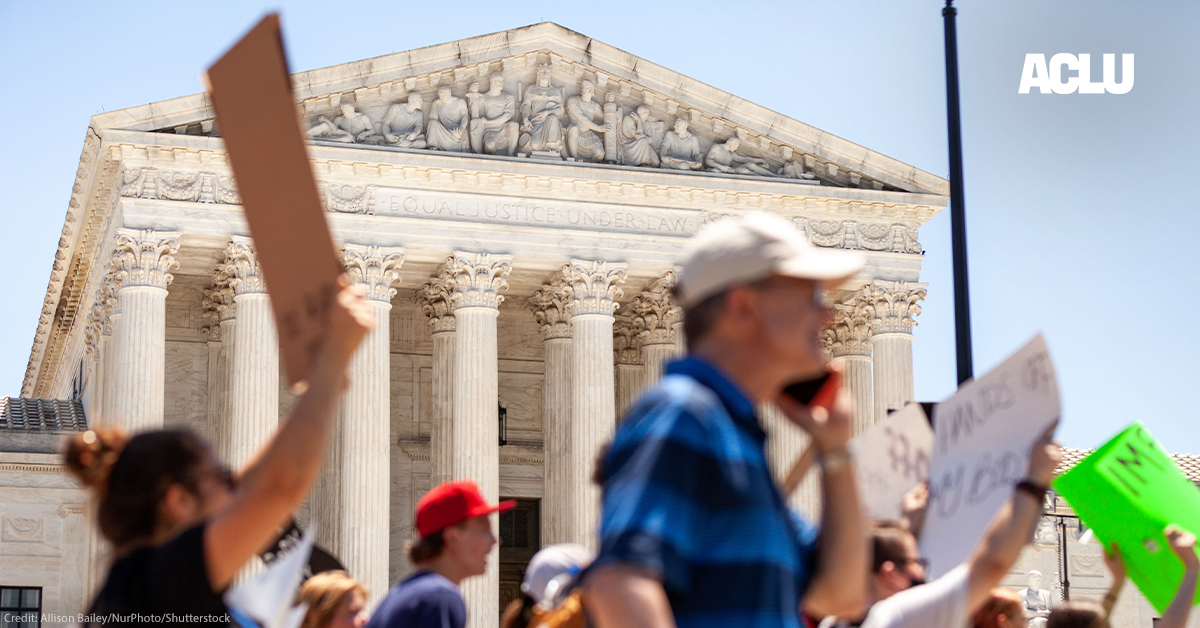The Supreme Court's most recent term reshaped the legal landscape on immigration, transgender rights, and free speech. But behind the decisions, procedural shifts like limits on nationwide injunctions and expanded use of the emergency docket signal a court increasingly driven by politics.
At the ACLU we believe that information is power, and that informed opinions make a more perfect union. That’s why we’ve taken a hard look inside this Supreme Court term and analyzed what the court’s cases reveal about its values, and how its direction and influence impacts our civil liberties.
To help us all better understand the civil rights and civil liberties issues at hand this Supreme Court term, our series, “Your Questions Answered,” brings your questions directly to ACLU experts for informed answers. In this installment, our legal director, Cecillia Wang, answers your most pressing questions on the Supreme Court.
Some have said the Supreme Court is conservative. Is the Supreme Court affiliated with a political party or ideology?
The Founders designed the Supreme Court to be an independent judicial body, not a political one. Justices are not elected and don’t represent political parties. They are appointed by the president, confirmed by the Senate, and hold lifetime appointments. This structure ensures that Supreme Court justices make decisions based solely on the Constitution and the law. But in practice, presidents typically nominate justices based on how their judicial opinions align with an administration’s political beliefs. The Senate confirmation process has also become increasingly partisan.
What is the emergency docket?
The emergency docket refers to cases that reach the court through a request to temporarily block a lower court’s decision from going into effect, or order relief the lower court denied, while litigation continues. It’s possible that more cases could end up on the emergency docket outside of the Supreme Court’s regular term.
The emergency docket was particularly fraught this term because of the large number of cases challenging the Trump administration’s actions. The Supreme Court sided more often with the Trump administration on emergency docket cases, allowing the government to move forward with actions the lower courts said were unlawful.
For example, the Supreme Court issued emergency orders in two of the ACLU’s cases challenging Trump’s invocation of the Alien Enemies Act to rationalize the detention and deportation of Venezuelan nationals without due process. In Trump v. J.G.G., the court granted the Trump administration’s request to pause a lower court order that blocked deportations under the Alien Enemies Act. The court ruled that the case should have been filed in the districts where our clients were detained, not in Washington, D.C. The ACLU then brought 10 new cases in district courts around the country.
The Supreme Court ruled on birthright citizenship. Did it eliminate this constitutional right?
No. The court only considered a technical — but important — question about when federal courts can block a law or policy nationwide, instead of for a particular person or group of people.
The Supreme Court ruled in June that federal judges should tailor injunctions, or blocks on a law, to reflect how the plaintiffs who brought the case are harmed. It disapproved of injunctions that block a law or policy nationwide without making that analysis. While it is clear that certain kinds of nationwide relief are still available under the court’s decision — including injunctions in nationwide “class actions” brought on behalf of groups of people — none of the existing birthright citizenship injunctions fit those molds. The Supreme Court ultimately did not answer the question of whether the existing injunctions were enough, leaving it to the lower courts to decide that.
This opened the door to the possibility that the government could partially enforce Trump’s executive order eliminating birthright citizenship, putting thousands of U.S.-born children at risk of being denied their constitutional rights based on the citizenship status of their parents. The ACLU filed a new nationwide class-action case, Barbara v. Trump, seeking a nationwide injunction — so that even if the court orders were cut back, the unconstitutional executive order would not be applied to anyone born in the United States. We won that injunction in early July.
The government continues to try to argue that the executive order is lawful in various courts nationwide, including in its appeal of our first birthright citizenship case, which is being heard by the First Circuit Court of Appeals on August 1. The nationwide injunction in Barbara helps to ensure that babies are not wrongly stripped of their citizenship while the litigation continues.
Why is it important to fight for our rights before the Supreme Court – regardless of how the court rules?
The Supreme Court is the highest court in our nation. It’s charged with ensuring equal justice under the law, as well as upholding rights guaranteed by the Constitution. The court’s decisions shape how our rights are interpreted over the course of generations, and in some cases even centuries. That's why at the ACLU we believe any case we argue before the court has a direct impact on our rights.
For example, in U.S. v Skrmetti, the court ruled against protecting gender-affirming care for minors in Tennessee. Yet this loss still elevates how discriminatory efforts are impacting the trans community and why we must keep fighting to protect LGBTQ individuals in all states, including Tennessee.
A loss can still help lay the groundwork towards shaping a future that better reflects our civil rights and liberties. For example, In 1872, the court upheld a state law barring women from becoming lawyers in Bradwell v. Illinois. The court said that the “natural and proper timidity and delicacy which belongs to the female sex evidently unfit it for many of the occupations of civil life.” A century later, the late Justice Ruth Bader Ginsburg challenged a different law that heightened scrutiny towards laws that discriminate based on gender. We’ve come a long way. At the ACLU, we recognize that the path to upholding our civil rights and civil liberties can sometimes be a long and complex one.
If the Supreme Court rules against our rights, what do we do?
The U.S. Supreme Court is not our only option to protect and expand civil liberties and civil rights. State supreme courts have the highest judicial authority in each state and make final decisions on state-based laws targeting constitutional issues. The ACLU launched the State Supreme Court Initiative to fight for the expansion of rights through state supreme courts. With lawyers in every state, the ACLU is dedicated to using state supreme courts to affect change at the state level to, ideally, influence federal or national policies.
The Supreme Court term is over, what happens now?
This term, the court served as an essential check on executive power at key moments. But in several high-profile cases, the justices issued rulings that favored the president. As a result, legal scholars and commentators have raised concerns about “the very real possibility that at least some of the justices . . . are worried about how much capital they have to expend in confrontations with President Trump.”
As the term concludes, attention now shifts to what lies ahead. The court may be in recess, but the constitutional stakes remain high. With the Trump administration continuing to press the boundaries of executive authority, fresh legal battles are all but certain. We expect the administration to continue to pursue its agenda through the emergency docket, forcing the court to act and limiting transparency into its procedures.The next term promises renewed challenges to the separation of powers, individual rights, and the rule of law.
The ACLU will be ready. Already we’ve filed challenges to expand and protect transgender rights, to end Trump’s assault on birthright citizenship and preserve free speech for all. Whether in federal courts or through public advocacy, we will stand at the front lines to defend civil rights and civil liberties from governmental overreach.
Date
Monday, August 4, 2025 - 1:45pmFeatured image



